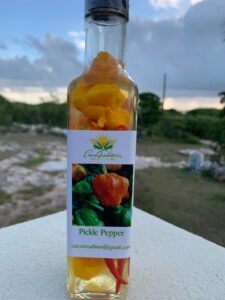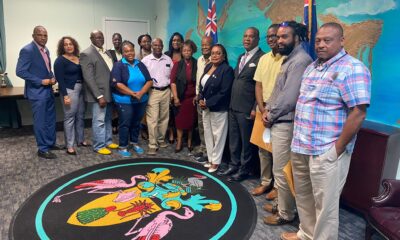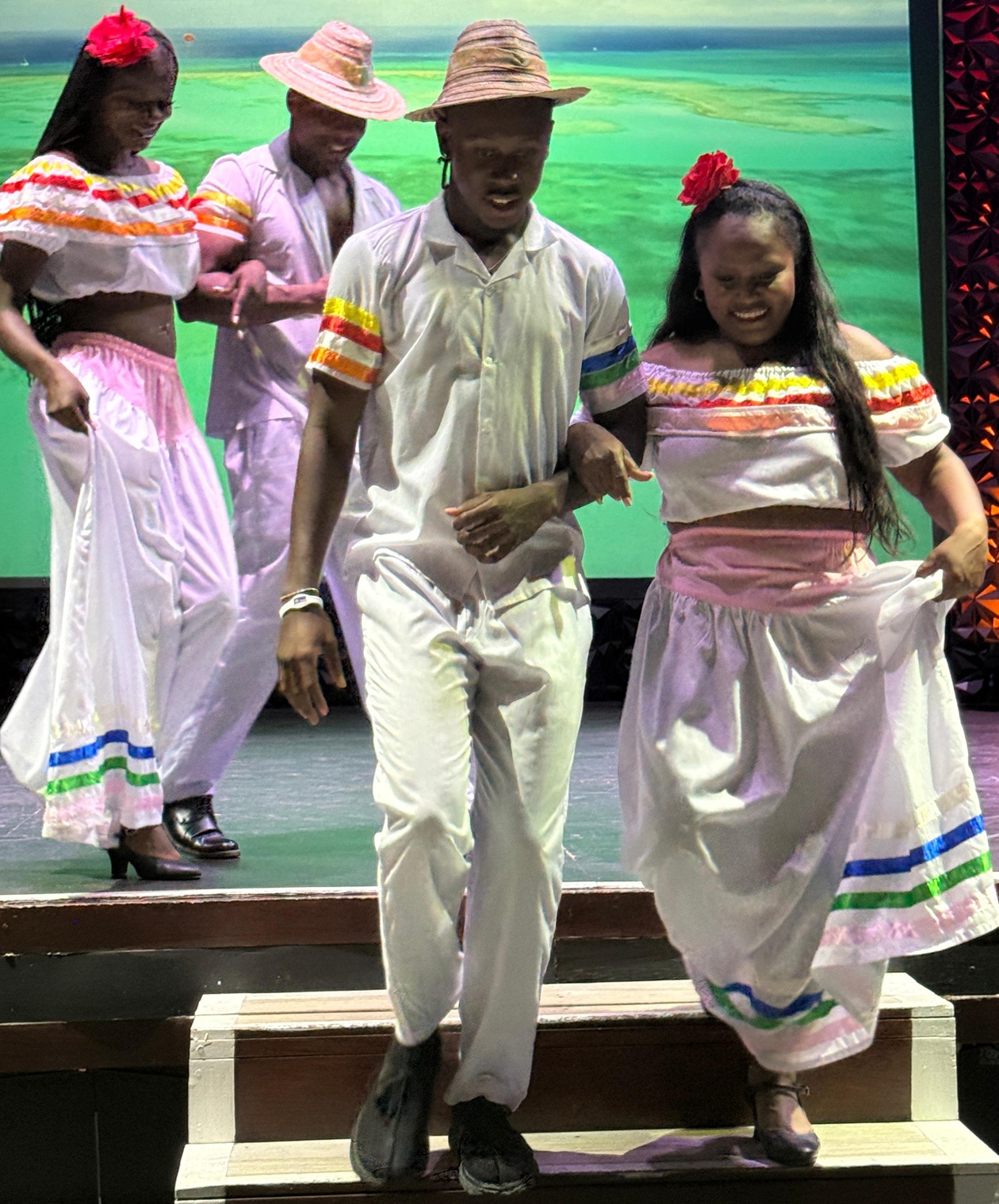News
Growing; a Woman who refuses to let TCI tradition rot in the field
Published
4 years agoon

By Shanieka Smith
Features Writer
#TurksandCaicos, April 5, 2022 – From Banking to Psychology to Farming, Mrs KacyDee Higgs, a forty-seven-year-old farmer from North Caicos resolutely confesses being a woman farmer has not been the easiest, but with equal determination, she tells the many challenges, I have grown to like you!
“My kitchen garden turned into my backyard garden and my backyard garden turned into a
farm,” she said as she chuckled and reminisced on the 10-years it took her to realise success as a farmer.
KacyDee Higgs started commercial farming in 2009. Higgs now has a thriving business patriotically called, Caicos Traditions, and her goal is to rejuvenate the staples of yesteryear.
Even as she balances her passion – farming, she currently works in the Mental Health Department for the Turks and Caicos Islands Government as a substance-dependence client counsellor.
“I get that question all the time [why farming?], especially from persons who know me and the jobs that I had before farming. I think they ask me that because, for years, we’ve been looking at agriculture as a demeaning job, so I get that question,” she admitted when we interviewed her following her recent awarding of a Government Agro-Grant.
Mrs Higgs was open and shared, one person asked why she would hang up a corporate jacket to do farming. “It came across pretty derogatory at first, but then I had to realize that they just didn’t see the vision that I had,” Higgs expressed.
Her vision for her Turks and Caicos Islands is to be a self-sufficient island nation, capable of feeding itself.
“A nation that cannot feed itself is not a growing nation,” Higgs expressed.
Her firm perspective is that food security is essential and agriculture should be the TCI’s top goal. In fact, the owner of Caicos Traditions said she believes farming should be taught from birth.
Though she acknowledged that farming is now being taken more seriously in the country, she emphasised that “food security is not only planting or giving a grant to plant food.” Higgs said, “for me, food security is making certain that should something strike this very moment, if you can give an account of 30 thousand people being in North Caicos, those 30 thousand people can be fed.”
The realisation of the significance of food security is the inspiration and motivation behind Caicos Traditions, where produce and herbs like corn, papaya, okra, sugar cane, sugar apples, sweet potatoes, cassava, basil, pepper, and a variety of peas like pigeon, cow, and dry beans bloom straight from the ground and are hanging off the trees.
She said she stuck with these foods, (staples of yesteryear) because they are more adaptable and conducive to the environment in the TCI, even with global warming and other existing environmental issues.
“The reason why Caicos Traditions has started this venture is to make certain that our heritage is carried on and our culture stays alive,” she added.
Higgs is married with four children and manages to be a star farmer. She also wears her jacket in the corporate space, and it would be remiss not to ask, “how do you do it all?”
“It is a work of art, I don’t have it all under control and sometimes I focus more on my job and my farm gets left behind but I try my best to keep my children on a good foot. She added, however, that most of her children are grown and are helpful in the farming department.”
When reflecting on how her children support agribusiness she drove home a profound point – farming is multifaceted. It is not just physical work on a farm; many other things are done behind and beyond the farm.
In all doings, there are challenges and successes. For Higgs, her series of challenges spiralled into her biggest success yet when it comes to her agribusiness.
“My biggest success for farming is seeing that my mills and my grits and corn flour are finally on the shelves of a grocer,” she expressed.
In a truly open exchange, revealing the length and breadth and depth of this Woman Farmer KacyDee said it was in a simple black and white composition book where she drafted her grand plans.
A cousin told her she is ten years ahead of her time – that was discouraging.
“…everywhere I twist and turn, I was getting knocked down. I had to move off the property that I was on, I had a three-year break from farming and I was like, if you want me to do this Lord, why are you making it so difficult?”
She lamented and she waited. In the waiting, throughout her three year break, KacyDee Higgs studied Psychology and had given up on farming or so she thought.
But as passion is a peculiar thing. It can go to sleep and be revived and so it was for her and the passion she has for farming and supporting the vision for national food security.
This champion businesswoman showed grit and picked it all back up.
Caicos Traditions would soon be outputting grits, corn flour and today, those products sit on shelves at Graceway IGA. The down home North Caicos product has also given birth to the idea and production of other traditional ingredients like grated coconut.
North Caicos is called the green island as the second largest in the TCI chain. It is home to farming and ingenuity. Though removed from the capital, Grand Turk and the main economic hub of Providenciales, it is not that far away.
A short ferry ride now does it, and perhaps soon a 12-minute flight will make the connections to key domestic markets more seamless. As farming undoubtedly turns a significant corner and mounts up as a dominant priority for smaller nations given the negative effects of geo-politics and the merciless health crisis, country leaders are now forced to pay proper attention to agriculture.
In the rich ‘brown gold’ of North Caicos, there grows the products island children were raised on and nourished with; there grows the value and offerings of KacyDee Higgs’ Caicos Traditions
You may like
-


Ministry of Tourism, Environment, Fisheries and Marine Affairs, Culture and Heritage, Agriculture, and Religious Affairs Delivers Impressive Quarterly Report on Achievements
-


Deer threatens Jamaica’s agriculture
-


Backyard Farmers to Benefit from Donation to Church Commercial Farming Group
-


Ministry of Agriculture Re-Launches Regattas, Homecomings, Festivals
-


Sunflower Oil Shortage
-


Farmers say Gov’t Finally Taking Agriculture Seriously; Gratitude for Agro-Grant funding
News
Commonsense, Not Confrontation: Why Kamla Persad-Bissessar Is Right
Published
1 month agoon
December 27, 2025
This debate did not start with Donald Trump, and it did not start this month.
For more than a decade, this reporter has had a front-row seat to repeated, urgent calls from across the Caribbean for stronger intervention by the United States in response to gun- and narcotics-fuelled violence that has hollowed out our communities. Long before today’s headlines, leaders warned that transnational gangs were outgunning police, draining public resources and stealing our youngest people.
Much of the public messaging leaned toward calls for fewer guns flowing from the United States, but the practical response from Washington evolved into something else: tactical undergirding of the Caribbean. Training, intelligence sharing, maritime surveillance and joint operations expanded under successive U.S. administrations — Republican and Democrat alike.
Then came Venezuela.
President Nicolás Maduro proved himself an unhinged and destabilising force, openly threatening Guyana’s oil-rich territory and pushing the region to the brink of a conflict no Caribbean state could afford. The United States showed up. The threat of war was blunted. That mattered.
But while geopolitical flames were contained, the narcotics trade exploded.
CARICOM convened emergency meetings on transnational gang violence. Crime became so pervasive that it was formally classified as a public health threat. Entire communities were terrorised. Courts clogged. Police forces stretched beyond capacity.
And now — quietly but noticeably — the tempo has shifted.
While no single forensic study can capture the full picture, it is easily verifiable on the ground that major narcotics busts and trafficking activity have slowed in recent months. Something has changed. Pressure works.
This is the reality Prime Minister Kamla Persad-Bissessar is responding to.
Her critics accuse her of breaking ranks. What she is actually doing is refusing to indulge in strategic hypocrisy — demanding international help to confront narco-terrorism while appearing to defend or excuse the very networks and actors we have spent years condemning.
Sovereignty is not an insult. The Caribbean invokes it constantly. To deny it to the United States — especially when the policies in question were telegraphed months in advance and remain adjustable — is not diplomacy. It is posturing.
What is most troubling is the region’s selective memory. CARICOM has directed months of rhetorical fire at Trump-era policies, yet when disaster struck — from security crises to Hurricane Melissa — the United States remained one of the region’s most reliable supporters. Outcomes matter more than allegiance theatre.
Kamla Persad-Bissessar is not suffering from Trump Derangement Syndrome. She is applying commonsense statecraft. She understands that small states do not gain leverage by moral outrage alone, and that credibility is lost when we appear aligned with individuals, regimes or activities we ourselves have deemed a threat.
Her warning to CARICOM is simple and necessary: do not undermine your own cause.
The Caribbean’s fight against narco-violence, corruption and instability has been long, costly and painful. If pressure is finally producing results, we should be wise enough to recognise it — and brave enough to say so.
Angle by Deandrea Hamilton. Built with ChatGPT (AI). Magnetic Media — CAPTURING LIFE.
News
Beaches Turks and Caicos Showcases and Supports Local Creativity
Published
5 months agoon
September 12, 2025
September 12, 2025
PROVIDENCIALES, Turks & Caicos Islands – The Turks and Caicos Islands are home to a wealth of creativity, from artisans and craft vendors to musicians and performers. Beaches Turks and Caicos, the Caribbean’s leading all-inclusive family resort, has pledged its continued support for these individuals by providing meaningful platforms for them to share their skills and stories with guests from around the world.
The resort’s commitment is most evident in its weekly Cultural Night showcase, where visitors are immersed in the vibrant traditions of the islands. Guests enjoy live performances which feature local music genres such as ripsaw, while artisans display and sell handmade creations. This event not only enriches the guest experience but also strengthens economic opportunities for local entrepreneurs.
Entertainment Division Manager Garett Bailey emphasized the significance of Cultural Night, “we want to showcase everything the Turks and Caicos Islands culture has to offer. Our goal is for guests to leave with a deeper appreciation of the island’s art, music and traditions, while giving local talent the opportunity to share their creativity with visitors from across the globe.”
Beyond Cultural Night, Beaches Turks and Caicos also welcomes local craft vendors onto the resort every Wednesday and Friday where they are offered a direct space to market their goods. Guests have easy access to the Turks and Caicos Cultural Marketplace, where they can purchase authentic local arts and crafts.
where they are offered a direct space to market their goods. Guests have easy access to the Turks and Caicos Cultural Marketplace, where they can purchase authentic local arts and crafts.
Managing Director, James McAnally, highlighted how these initiatives reflect the resort’s broader mission, “we are committed to celebrating and sharing the vibrant culture of these islands with our guests. By showcasing local artistry and music, we not only provide entertainment but also help sustain and grow the creative industries of the Turks and Caicos Islands. From our cultural showcases to nightly live music, we are proud to create authentic connections between our guests and the people of these islands.”
Local musician Keon Hall, who frequently performs at the resort, expressed gratitude for the ongoing partnership, “being able to share my music with Beaches’ guests has created lasting relationships. Some visitors return year after year and request songs from previous performances. This partnership continues to celebrate what we do and strengthens the bond between local artists and the resort.”
The resort’s support of local artisans and entertainers extends beyond business opportunity; it is about preserving heritage and sharing stories. Guests take home more than souvenirs; they leave with experiences that deepen their understanding of Turks and Caicos’ culture and history.
Public Relations Manager, Orville Morgan, noted the importance of this commitment, “for many visitors, these interactions represent their first genuine connection to the Turks and Caicos Islands. From artisans and musicians to farmers and transport operators, our local talent helps shape every guest experience. At Beaches, we are proud to give them the stage to share their stories and their heritage.”
Beaches Turks & Caicos remains dedicated to developing cultural connections and supporting the artisans, musicians and entrepreneurs whose creativity makes the Turks and Caicos Islands unique. Each guest experience is an opportunity to celebrate and sustain the spirit of the islands.
Caribbean News
“Barbecue” is Cooked! US Turns Over 11 Million Haitians into Potential Informants with $5 Million Bounty
Published
6 months agoon
August 12, 2025
August 12, 2025
The United States just set fire to the underworld in Haiti — and this time, the smoke might finally flush out the man many call the most feared in the Caribbean.
On Tuesday, the U.S. government slapped a $5 million bounty on the head of Jimmy “Barbecue” Chérizier, the ex-police officer turned gang boss accused of orchestrating massacres, torching neighborhoods, and strangling Haiti’s capital into chaos. This isn’t just a headline — it’s a full-blown game-changer.
turned gang boss accused of orchestrating massacres, torching neighborhoods, and strangling Haiti’s capital into chaos. This isn’t just a headline — it’s a full-blown game-changer.
That kind of cash — offered under the State Department’s Transnational Organized Crime Rewards Program — is enough to turn the country’s entire population, more than 11 million people, into potential informants overnight. Add the millions in the Haitian diaspora, and Chérizier isn’t just wanted. He’s surrounded.
The Number That Changes Everything
Five million U.S. dollars today equals about 655 million Haitian Gourdes. In a country where many scrape by on less than $5 a day, that’s not just life-changing — it’s life-defining. It’s enough to rebuild homes, put generations through school, or buy a one-way ticket far from the gunfire.
In a place where trust is scarce and survival is everything, that figure is more than tempting — it’s irresistible. For Chérizier, it means every friend could be a future informant, and every loyalist might be calculating the cost of staying loyal.
‘We Will Find Them’ — Jeanine Pirro, U.S. Attorney
Jeanine “Judge Jeanine” Pirro, the U.S. Attorney, set the tone with fire in her voice. “This indictment is the first of its kind,” she announced. “Jimmy Chérizier, also known as ‘Barbecue,’ is a notorious gang leader from Haiti who has orchestrated and committed various acts of violence against Haitians, including the 2018 La Saline attack in which approximately 71 people were killed. He both planned and participated in that massacre.
“Anyone who is giving money to ‘Barbecue’ cannot say, ‘I didn’t know.’ They will be prosecuted, and we will find them. They are supporting an individual who is committing human rights abuses, and we will not look the other way.”
Pirro wasn’t just going after Chérizier. She was sending a warning to the Haitian diaspora accused of feeding his war chest from abroad: the days of claiming ignorance are over.
‘No Safe Haven’ — Darren Cox, FBI
Then came Darren Cox, Deputy Assistant Director of the FBI, delivering the muscle of America’s most powerful investigative force. “There is no safe haven for Chérizier and his network,” Cox declared. “We are closing every link, every cell.” Since January, he said, the FBI has arrested three Top Ten fugitives, taken more than 19,000 criminals off the streets, and seized thousands of tons of narcotics — enough to save millions of lives across the U.S.
The FBI’s Miami and Houston offices have already bagged one of Chérizier’s Viv Ansanm associates inside the United States without firing a shot. “These efforts are a deliberate and coordinated plan,” Cox said, “to protect our communities and confront escalating threats from terrorist organizations like Viv Ansanm.”
‘Three-Year Investigation’ — Ivan Arvelo, HSI
Ivan Arvelo, Assistant Director of Homeland Security Investigations, brought the receipts. “This is the result of a three-year investigation into Chérizier’s procurement networks, cash pipelines, and operational financing that violates sanctions,” he explained. Arvelo described 400 structures destroyed, entire communities erased, and a gang exploiting U.S. dollars, technology, and immigration loopholes to keep its killing machine running. “We tracked how Americans unwittingly bankrolled brutality,” he said — proof that the net is tightening both inside Haiti and abroad.
‘The Worst of the Worst’ — Chris Lambert, State Department
Chris Lambert, representing the State Department’s International Affairs division, gave the political bottom line.
“Mass violence in Haiti must end,” Lambert said. “The instability resulting from Chérizier’s actions fuels illegal migration, regional instability, and transnational crime. We will continue to apply every tool available — including our rewards programs — to stop the spread of unchecked violence, especially to target the worst of the worst criminal leaders threatening the people of our hemisphere.”
instability, and transnational crime. We will continue to apply every tool available — including our rewards programs — to stop the spread of unchecked violence, especially to target the worst of the worst criminal leaders threatening the people of our hemisphere.”
Lambert confirmed what many have long known: Chérizier is not just a gang leader. He commands Viv Ansanm, officially designated in May as a Foreign Terrorist Organization. In the eyes of the U.S., that makes him not just Haiti’s problem — but everyone’s.
Why Haitians May Not Resist
In Haiti, money talks — loudly. And when you put 655 million Gourdes on the table, it shouts.
That’s the kind of figure that turns casual acquaintances into informants and makes even the most hardened loyalist wonder if the payout is worth more than the risk. It’s not a matter of “if” word gets out, it’s a matter of “who will be first to collect.”
For grieving families, it’s a chance at justice. For the desperate, it’s a chance at survival. For Haiti as a whole, it’s hope — wrapped in the most dangerous of temptations.
An Answer to Prayers
For years, Haiti’s headlines have been a scroll of horrors — kidnappings, executions, burned neighborhoods, bodies in the streets. Chérizier’s name has been attached to too many of them.
This move by the U.S. isn’t just strategy. It’s personal. It’s a signal to every Haitian — at home or abroad — that the days of impunity could be ending.
I’ll admit it: when I heard the news, I danced, I sang, and I nearly cried. Not because $5 million is a lot of money, but because of what it means — the possibility, at last, of stopping the man accused of helping turn Haiti into hell on earth.
Four officials, four angles, one mission: Pirro’s fire, Cox’s grit, Arvelo’s precision, Lambert’s conviction. Together, they’ve put the heat on “Barbecue” like never before.
BBQ is cooked. The only question now is: which one of over 11 million potential informants will serve him up?





